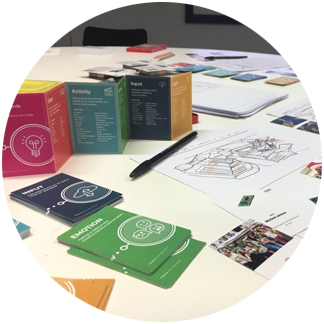Dr. Kyungah Choi and Taesu Kim published an article entitled “Lighting User Experience (LUX) Cards: A Card-based Tool for the Design of Smart Lighting Solutions” in the journal Archives of Design Research. The paper introduces the design and evaluation of the Lighting User Experience (LUX) Cards created to support idea generation among designers involved in designing smart lighting solutions. We hope this material provides a greater understanding of smart lighting design and furnishes new opportunities to design practice.
Abstract
The introduction of smart lighting technology, which has coincided with recent research on the psychological and physiological impacts of light, furnishes the practice of design with new opportunities. Despite such potential, design tools for smart lighting solutions are, to date, unavailable. In this paper, we introduce Lighting User Experience (LUX) Cards, created to support designers’ innovation of human-centered smart lighting solutions. The LUX Cards consist of 103 cards, grouped into five categories: user, activity, input, emotion, and light. We evaluated the cards, using a workshop in which design students deployed the cards to address relevant design problems. During the workshop, participants used the cards to acquire knowledge, draw inspiration, and foster group collaboration. Among these uses, the cards’ greatest value arose from their ability to inform the participants, who generally lacked relevant knowledge on lighting. We observed a pattern of use of the light category that distinguished it from the other categories. While the other cards fostered divergent thinking, the light cards facilitated the refinement and convergence of ideas. In the later phases of design, participants depended primarily on the light category as they sought information. In contrast, the cards’ ability to inspire participants and boost collaboration decreased over time, highlighting areas that required further improvement. Drawing on our observations, we redesigned the cards and provided guidance to promote card uses across a wider range of design contexts. In this study, we designed and evaluated the LUX Cards to support the idea generation of designers involved in the rapidly emerging smart lighting design industry. Design plays an essential role in assimilating new technologies into our lives, and this study’s findings are expected to guide future development of similar tools to acquaint designers with the field’s emerging issues, challenges, and opportunities.
Link to the article


